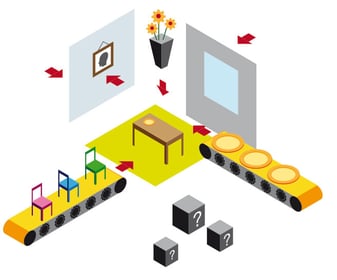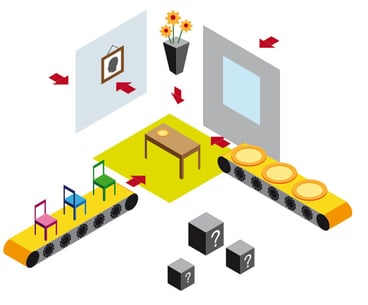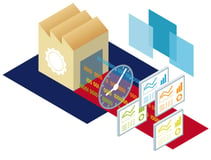Why Industry 4.0 Will Create More Business Moments
Brian Hoey - April 26, 2018

 Imagine you’re living in a smart home. One evening after work you decide to drive to the grocery store to pick up snacks and drinks for an upcoming party that you’re hosting. When you take the road to the market rather than your usual route home, your car sends a notification to the appliances awaiting you at your house. The refrigerator, sensing that you’re low on milk, sends a reminder to your phone to pick some more up. Your dishwasher, tracking your detergent usage over time, estimates that you will run out before you next go shopping, because you usually wait at least a week between trips. Lastly, your car sends a text alert to your spouse, who might remind you of your guests' snack food preferences or other salient details.
Imagine you’re living in a smart home. One evening after work you decide to drive to the grocery store to pick up snacks and drinks for an upcoming party that you’re hosting. When you take the road to the market rather than your usual route home, your car sends a notification to the appliances awaiting you at your house. The refrigerator, sensing that you’re low on milk, sends a reminder to your phone to pick some more up. Your dishwasher, tracking your detergent usage over time, estimates that you will run out before you next go shopping, because you usually wait at least a week between trips. Lastly, your car sends a text alert to your spouse, who might remind you of your guests' snack food preferences or other salient details.
The above is a textbook example of a business moment, i.e. a transient event that businesses can dynamically take advantage of by better understanding the connections between different factors. But it might also remind you of something else: that’s right, a smart factory. Just as the smart home in our example connects numerous technological processes into one visible, adaptable stream, the modern conception of a smart factory involves a similar set of interconnected workflows, internet-of-things (IoT) devices, and real-time machine and fleet usage data. In fact, both concepts are built on the same principles of cyber-physical interconnectivity; each one can help us understand the other, and ultimately each one will add value to the other.
What are business moments?
At this point you may be wondering what, exactly, constitutes a business moment. In the example above, the fact that multiple technologies work together to capitalize on a particular event (i.e. stocking up for a party) is what makes for a true business moment. Other common examples involve a car breakdown, in which your automobile sends out alerts to AAA and the nearest auto body shops, which may in turn alert their suppliers of a new need for specific parts related to the necessary repairs; or a smart home owner repainting a bedroom, resulting not just in reminders to buy paint, but to buy laundry detergent for the inevitable mess that will be made of the painter’s clothing. To be a little more technical, Gartner defines business moments in terms of fruitful interactions between People, Businesses, and Things: People take actions or enter scenarios in which Things can record data and interact with larger systems, allowing Businesses to become involved in solving the problems that the People are facing.
While occurrences like these might not be day-to-day realities in 2018, the technological underpinnings for “event-driven IT” already exist and are gaining ever-wider adoption. Consider how quickly IoT-enabled consumer goods like smart watches and Fitbits have become ubiquitous—more complete integration within a larger digital ecosystem can’t be far behind, meaning that digital businesses will soon experience never-before-seen opportunities to interact with their customers in a meaningful way.
Smart Factory Integration
Part of what will enable the rise of business moments going forward is the increasing degree of connectivity that defines consumer goods, but the rise of the smart factory, not to mention Industry 4.0 more broadly, will be equally crucial to the development of these dynamic opportunities. Just as IoT devices, automobiles, and even home appliances must effectively communicate with one another in a connected digital ecosystem in order to facilitate these instances, the supply chain itself must boast an equal or greater degree of connectivity and communication in order to fully take advantage of such situations. In the party planning example, it’s important for the grocery store to have all of your required items in stock, but the supply chain challenges are otherwise not too great. In the case of a car accident, on the other hand, your business may need to reroute transport in order to ensure that the auto body shop has the necessary parts for the repair, which requires the ability to gain insight into your production plans, inventory usage, and freight usage on a moment’s notice.
This is where the power of Industry 4.0 workflows should become evident. It isn't be too hard to imagine a scenario in which alerts from automobiles are sent directly to automotive manufacturers, who can not only ensure that they have the right parts in the right place at the right time, but can automatically log the details of the incident. If a pattern is established in which breakdowns often result in the need for a particular part, integrated planning systems can update their demand forecasts accordingly and adjust any relevant planned production programs to reflect the new information. By the same token, automotive manufacturers could receive updates from IoT devices from multiple auto body shops in real-time, enabling them to dynamically reroute shipping as needed when an event occurs.
Of course, to capitalize on these moments, Industry 4.0 integration is not a luxury but a necessity. Not only does it promote the sort of digital supply chain that can integrate with the digital consumer systems emerging all around us, it also paves the way for the high degree of supply chain flexibility and adaptability that companies need in order to respond to emerging scenarios with little to no lead time. A lean supply chain that constantly adjusts to new and shifting modalities is the only way to cope with the fast-paced, fundamentally fleeting nature of business moments. Manufacturers that are able to implement Industry 4.0 systems, however, will be able to produce more actionable business moments and take advantage of the opportunities that they represent.
LATEST POSTS
- Understand Circular Economy in The Manufacturing Industry
- How Can Industry 4.0 IT Integration Be Achieved Smoothly?
- The Significance of Order Sequencing in Discrete Manufacturing
- How to improve your Supply Chain Management: The Power of Control Towers
- Optimizing Human Resource Scheduling in Manufacturing: A Technological Approach



